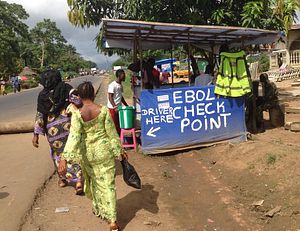On February 23, Japan’s Defense Ministry decided against dispatching a Ground Self-Defense Force (GSDF) unit to join the fight against Ebola in Sierra Leone. The GSDF unit would have assisted international efforts to battle the spread of the Ebola virus by ferrying doctors and medical supplies.
The plan the Defense Ministry submitted to the prime minister’s office on February 18 called for 400 GSDF personnel to begin operations in April, with a possible Maritime SDF contingent to serve as base of operations. The GSDF would not have been involved in transporting Ebola patients. However, concerns about infection remained, and ultimately tabled the plan. There was also concern about scheduling and public opposition to such a deployment. According to Asahi, some members of Prime Minister Shinzo Abe’s inner circle opposed the plan, “[questioning] whether there was any need for such a mission.”
Since the Ebola outbreak began in West Africa over a year ago, there have been nearly 24,000 cases and more than 9,600 deaths, according to the World Health Organization. Guinea, Liberia and Sierra Leone have been hardest hit.
Abe pledged 500,000 sets of protective gear for medical personnel in Africa last September, and Air SDF was used to transport medical supplies to Ghana in December. This was the first overseas dispatch of an SDF team to deal with the Ebola crisis and was conducted under the auspices of the Japan Disaster Team Relief Law.
However, with more than 3,000 deaths from Ebola in just Sierra Leone, the Defense Ministry sought other ways to get involved, as simply providing medical equipment began to appear inadequate. The SDF mission to Sierra Leone was given serious consideration after Britain reached out to Japan as part of its wider effort to seek international support for efforts in Sierra Leone during the British troops’ temporary absence from the country between March and June. London is particularly concerned about the fate of Sierra Leone because Sierra Leone is a member of the British Commonwealth.
The massive scale of this tragedy provided an opportunity for countries to rally and work together on a serious issue in a collaborative way. The Ebola crisis also provided an opportunity for militaries – including the U.S. military – to showcase their worth in humanitarian missions.
This is exactly what China did last year when the People’s Liberation Army (PLA) not only handled the logistics of Chinese aid, but also stood at “the front-line” by sending nurses, doctors, and other medical experts to treat patients and provide technical training. The Chinese leadership seized the opportunity to put into practice the fourth of the “new historic missions” promoted by then-President Hu Jintao in 2004, which is “[to play] an important role in safeguarding world peace and [promote] common development.” Not only has this shown the “softer side” of the PLA, it has also allowed China to be seen as a “responsible power” by the world.
Japan, meanwhile, has fumbled in its response, punting on an opportunity to highlight the SDF’s ability to contribute to world peace in a non-military way. An SDF dispatch to Africa would have been especially useful in this regard, because African countries are not ensnared by historical memories of Japan’s former Imperial Army’s rampages. A deployment to Africa would not have met the same opposition that would dog any potential dispatches in the Asia-Pacific region. Abe has advocated a vision for Japan’s diplomacy based on the vision of “proactive pacifism” but in this instance he chose to put Japanese lives and his government’s own political interests ahead of global well-being.
Though the SDF component of Japan’s commitment will not expand, Japan will continue to provide aid to African countries fighting Ebola through both governmental and non-governmental channels. The Japanese government plans to set aside 90.9 billion yen (approximately $750 million) in aid for Ebola-hit West Africa and other humanitarian assistance measures. Japan will also provide $2 million to Doctors Without Borders.
Japan’s most recent contribution is taking an interesting turn, focusing on the psycho-social health of affected communities. The Japan Social Development Fund, a trust fund operated through the World Bank that is active in Liberia, announced on February 25 an initiative to deal with the psychological effects of the virus. This $3 million program, implemented by the Carter Center, is expected to treat 18,000 Liberians and help address mental health needs and build social resilience in the counties of Montserrado and Margibi.
If the way the Japanese government is handling this Ebola crisis is any indication of how it will handle future international health and humanitarian crises, expect more of the same checkbook diplomacy with only a minimal SDF component. Meanwhile, China pulls ahead by burnishing its image as a “responsible stakeholder” though its more skillful use of the PLA.
































